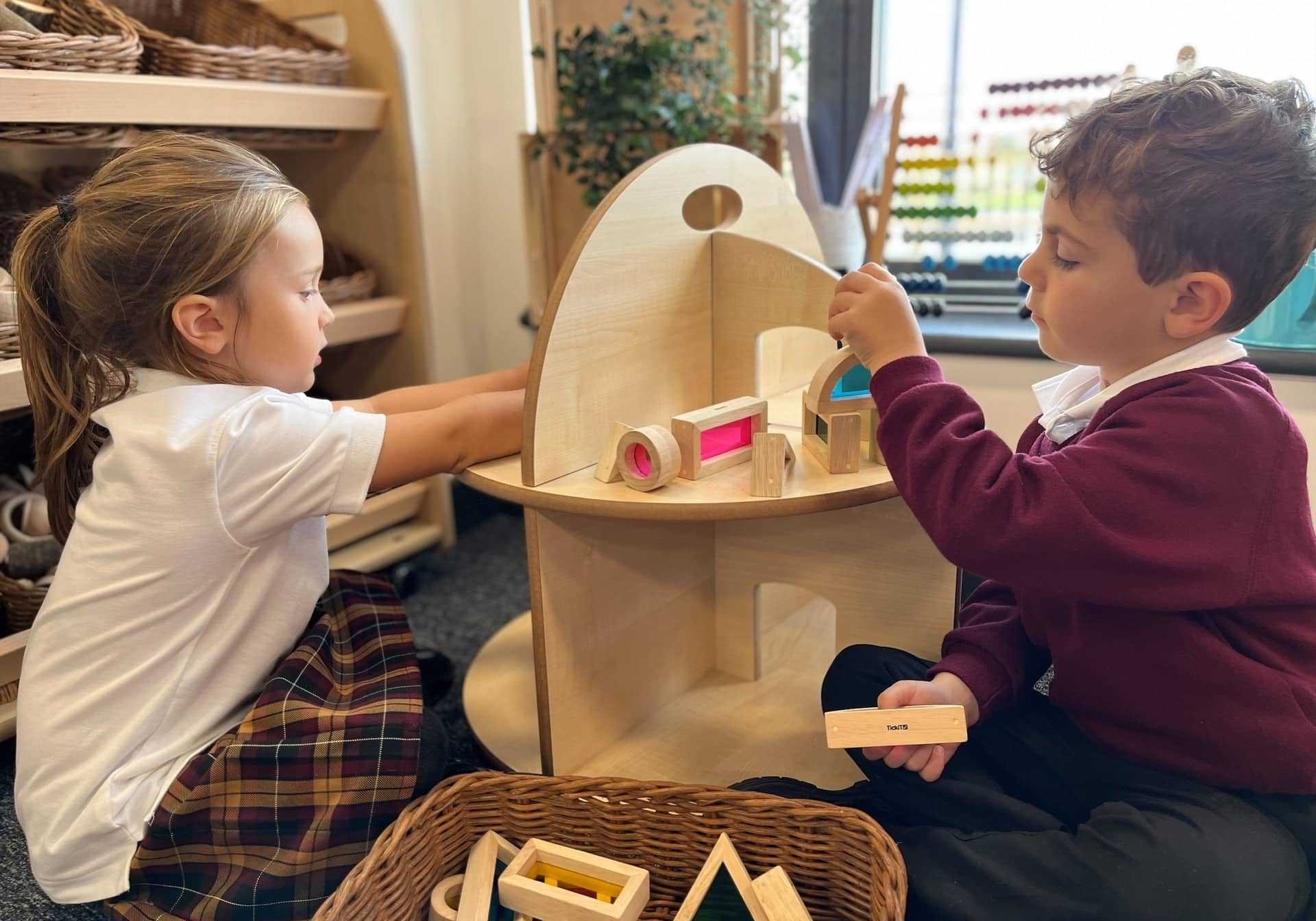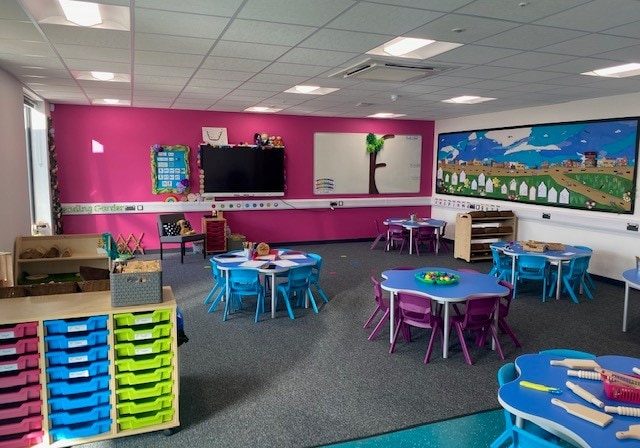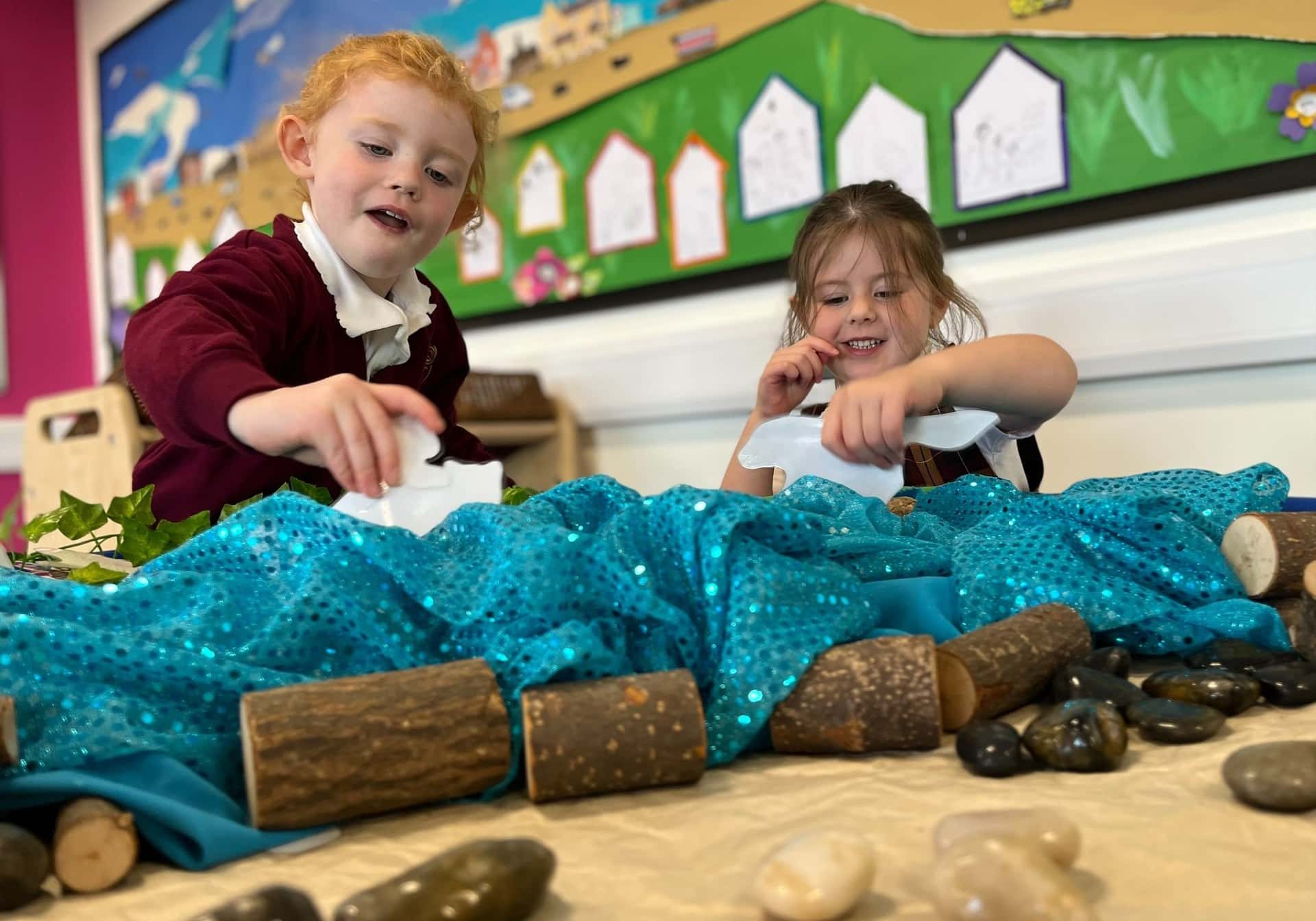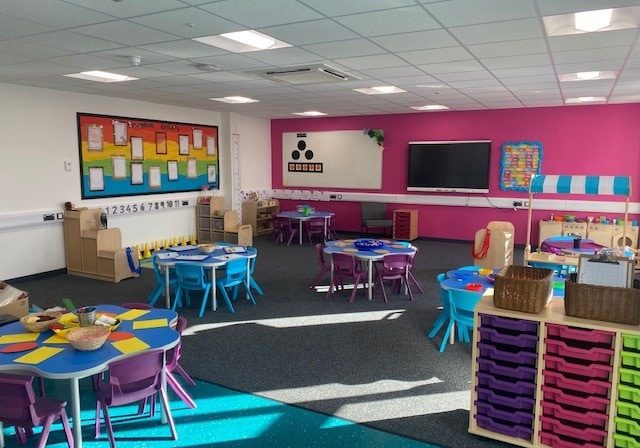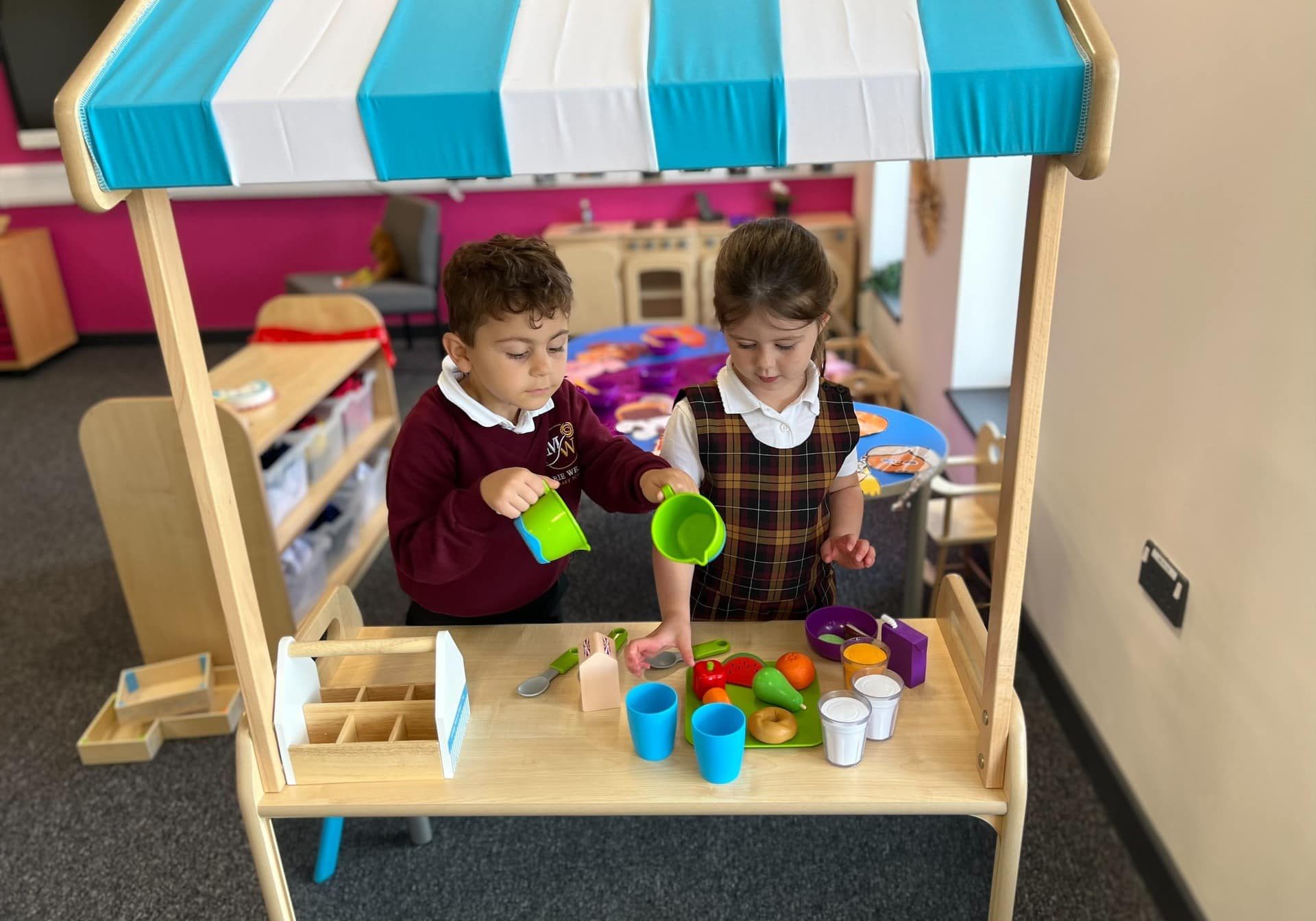In This Section
English
At Marie Weller, our English curriculum aims to ensure that all pupils develop the required core skills and knowledge to prepare them for the next stage in their learning. The core English curriculum is divided into the following strands:
Phonics
We teach the sounds first – in a specific order. We then teach your children to blend those sounds together in order to read words. The children read words in the matched storybooks. Each Storybook is carefully matched to the sounds they can already read – setting them up for success. We read to children ‘real’ books’. Once they have learnt to read, they will be able to independently read these books for themselves.
The English language is very complex. Phonics is the method of teaching reading through the identification of sounds and graphemes. All words are made up of sounds e.g. in ‘mat’ we have the sounds ‘m’, ‘a’,‘t’. A grapheme is another name for the letters we use to write the sound. Write the letters ‘m’ ‘a’ ‘t’ in the air as you say the sounds. We teach phonics so that your children will have the tools to read any word.
We teach using pure sounds. We use pure sounds (‘m’ not’ muh’, ’s’ not ‘suh’, etc.) so that your child will be able to blend the sounds into words more easily. Children need to know sounds – not letter names – to read words.
It shows the most common graphemes for each sound. Each box is a sound box showing different ways to read and write the sound.
We also use Fred in our classrooms. He is a frog who can only speak in sounds, and we call this Fred Talk. For example ‘m’ ‘a’ ‘t’, ‘l’ ‘u’ ‘n’ ‘c’ ‘h’. He helps children sound out words so they can read and spell.
Once they can Fred Talk and blend sounds into words from the simple chart, we teach them Set 3 sounds on the complex chart – the other ways of reading and writing each sound so that they can soon read anything.
More information can be found in the Phonics section.
Reading
At Marie Weller we’re proud to use Readerful, a thoughtfully designed reading programme that supports every child’s journey into literacy, learning, and global awareness.
What is Readerful?
Readerful is built on the Systematic Synthetic Phonics RWI program we use, but goes beyond phonics to offer a rich, inclusive reading experience. It’s designed to help children read more, enjoy reading, and gain the many benefits that come with it.
Key Features of Readerful
- Five Golden Threads: These themes run through all Readerful books to promote enjoyment, inclusion, and deeper learning. These threads are based on research-informed principles that foster a lifelong love of reading. They are:
- Access
Children are more motivated to read when they have easy access to books that reflect their interests, abilities, and lives. This includes ensuring diverse and inclusive book collections and reading aloud to introduce new titles. - Choice
Allowing children to choose what they read helps them connect with books that resonate personally. Guidance and modelling are important to help them make informed choices. - Time
Providing dedicated time for reading in school supports reading habits at home. Time to read, discuss, and share books helps build reading communities and encourages regular reading. - Connection
Books should connect with children’s experiences, emotions, and interests. This emotional and cognitive engagement deepens their relationship with reading and helps them see its relevance. - Success
Children need to feel successful in their reading journey. Celebrating progress and providing appropriate challenges builds confidence and reinforces positive reading experiences.
These threads aim to create a rich reading culture where children are not only taught how to read but are inspired to love reading.
- Independent Library: A wide range of levelled books for children who have moved beyond phonics.
- Books for Sharing: Each year group has access to books designed to be enjoyed together, encouraging discussion and connection.
Why Motivation Matters
Research shows that motivation and engagement are key to helping children read more and enjoy it. The right environment can inspire children to become enthusiastic readers.
Building Knowledge Through Reading
Reading isn’t just about decoding words—it’s about understanding the world. Children with strong general knowledge are better prepared for future learning and life as global citizens.
Readerful books are chosen to extend children’s knowledge through enjoyable, inclusive texts. Each Readerful title links to one of eight knowledge themes:
Discovery and Adventure
Books that spark curiosity and encourage children to explore new places, ideas, and experiences. These stories foster a sense of wonder and a love for learning.
Inventions and Ideas
Stories that highlight creativity, innovation, and problem-solving. Children learn about inventors, discoveries, and how ideas shape our world.
Our Shared Planet
Books that focus on nature, the environment, and sustainability. These stories help children understand their role in protecting the planet and appreciating its beauty.
Identity and Belonging
Stories that explore personal identity, culture, and relationships. These books help children understand themselves and others, promoting self-esteem and empathy.
Creativity and Expression
Books that celebrate the arts, imagination, and self-expression. Children are encouraged to think creatively and appreciate different forms of artistic expression.
History and Heritage
Stories that connect children to the past, helping them understand historical events, traditions, and the importance of heritage in shaping our present.
People and Community
Books that highlight the importance of community, cooperation, and social responsibility. These stories teach children about working together and valuing diversity.
Power and Change
Stories that examine leadership, justice, and transformation. Children learn how individuals and groups can make a difference and bring about positive change.
MWPS Reading Curriculum Overview
Spelling
We use the Read, Write, Inc. scheme for delivering our spelling curriculum. This is introduced in Year 2 once the children have the required knowledge in order for them to understand the alphabetic code.
For those children who are not yet ready, then continued focus on phonics is essential to give them the skills needed to progress in their learning.
RWI spelling is designed for all children to access throughout Key Stage 2 and systematically builds upon good phonic knowledge in order to spell words and patterns of growing complexity.
The short, daily sessions engage and inspire children through a variety of fast-paced activities, which embed understanding of key spelling patterns to long-term memory through regular and repeated revision. Children do not receive weekly spelling lists to learn from this for homework but will have access to the common exception word lists as exemplified in: National Curriculum – English Appendix 1: Spelling.
Writing
At Marie Weller, we aim to ensure that all children leave us with the ability to confidently write at length across a range of genres, with a solid understanding of the grammatical skills required, in order to be clear and coherent in what they want to say.
We have adopted the Read, Write, Inc. scheme for handwriting in Early Years and Key Stage 1 to provide a consistent and systematic approach to the fundamental skills needed for children to become confident writers.
This scheme enables children to develop their automaticity in formation, orientation and placement of letters, which frees up space in their working memory.
Children who are able to write legibly, with fluency and at pace, can focus on the content of what is written and are more likely to develop into creative, imaginative writers.
Our children will write across a wide range of genres throughout their time at Marie Weller. High quality stimuli are integral to engage and inspire children to write for a variety of purposes and audiences.
Extracts from modern and classic novels, poems and non-fiction texts along with video clips constitute a large part of these, however where possible we encourage the use of drama, music and first-hand experiences from trips and visitors to give writing a clear purpose for our children.
As part of our curriculum offer, we ensure that our children are exposed to a diverse range of writing from many different cultures that broaden their understanding of the world that is both around them, and that lies ahead.
Key grammar skills are explicitly taught, and understanding is embedded throughout our writing curriculum.
In Key Stage 1, children are taught the basic skills to construct clear and accurate sentences to ensure they enter Key Stage 2 being able to access the rich curriculum before them. Throughout Key Stage 2, grammar skills are systematically taught and subsequently revisited to enable children to become confident in their use and manipulation.
MWPS Writing Curriculum Overview
MWPS Writing Skills Progression
Speaking and Listening
All subjects across our curriculum play a significant role in developing key English skills, particularly speaking and listening.
Other subjects are planned with an emphasis on building vocabulary progressively and understanding its meaning and application in context.
We draw on the themes of our curriculum intent to provide pupils with opportunities to engage directly with our local and wider communities. For example, presenting at community events; planning and leading local initiatives in addition to interacting and interviewing a wide range of visitors to our school.
Enrichment
Each year the English curriculum enrichment includes visiting authors, attendance at the film festival, theatre visits, topic specific trips, Young Shakespeare Company visits, house writing and poetry competitions, children’s participation in drama and choir productions – all of which present creative opportunities to build the character and confidence within our pupils.

